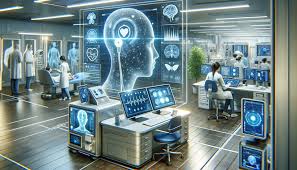
In recent years, artificial intelligence (AI) has made tremendous advances in a number of sectors, substantially changing businesses and boosting human skills. One of the most promising areas where AI has the potential to make a significant effect is in mental health care. As we learn more about the complexity of mental health and the limits of current treatment choices, AI emerges as a revolutionary tool capable of transforming how we diagnose, treat, and helps those with mental health issues.
Enhanced Diagnostics and Personalised Treatment
One of the most fascinating elements of AI in mental health is its ability to improve diagnosis and customise treatment strategies. Traditionally, mental health diagnostics have been based primarily on subjective assessments and self-reported symptoms, both of which can be unreliable and biassed. AI, on the other hand, can analyse enormous amounts of data from a number of sources, including genetic markers, brain imaging, and behavioural patterns gathered by wearable devices or smartphone apps.
Machine learning algorithms can identify small trends in this data that humans may miss, resulting in more rapid and precise diagnoses. For example, AI-powered systems may analyse speech patterns or facial expressions during virtual therapy sessions to measure changes in mood or behaviour over time, providing physicians with vital information about their patients’ mental health.
Accessible and Scalable Mental Health Support
Another significant benefit of using AI into mental health care is the ability to make assists more accessible and scalable. The demand for mental health services often exceeds available resources, resulting in prolonged wait periods and inadequate treatment for many people. AI-powered chatbots and virtual assistants may give rapid assistance by delivering customised coping methods, psychoeducation, and crisis intervention around the clock.
Moreover, AI-powered teletherapy processes may connect patients with licenced therapists remotely, breaking down geographical obstacles and increasing access to specialised treatment for underprivileged communities. These technologies, which use natural language processing and sentiment analysis, may customise treatments to individual requirements, ensuring that patients receive prompt and appropriate assistance whenever they require it.
Predictive Analytics and Preventive Intervention
AI’s capacity to analyse enormous quantities of data provides up fresh possibilities for predictive analytics and preventative interventions in mental health treatment. By continually monitoring physiological and behavioural data, AI systems can detect early signals of relapse or worsening in people with chronic mental health issues. This proactive strategy enables doctors to respond quickly, perhaps lowering the number of hospitalisations and increasing long-term results.
Furthermore, AI may use population-level data to discover patterns and risk factors for mental health issues. This information can help to guide public health strategies and policy decisions targeted at diminishing the prevalence of mental disease and increasing mental well-being on a larger scale.
Ethical Concerns and Challenges
While the potential benefits of AI in mental health treatment are enormous, its implementation presents ethical concerns and hurdles that must be overcome. Privacy issues, algorithmic biases, and the need for open and responsible AI systems are all valid points of concern. Ensuring that AI applications in mental health match to ethical norms and prioritise patient safety and autonomy is critical to earning public trust and realising the advantages of this technology.
Lastly, artificial intelligence offers tremendous potential for being a key component of mental health treatment in the future. AI has the potential to revolutionise the landscape of mental health care delivery by improving diagnosis and personalising therapy, as well as increasing accessibility and scalability. By using AI-driven technologies responsibly and ethically, we may empower doctors, support individuals in distress, and eventually promote a healthy society in which mental health is prioritised and supported by cutting-edge technology. As we traverse the issues ahead, collaboration among engineers, doctors, politicians, and ethicists will be critical to realising AI’s full promise to transform mental health treatment for future generations.

The author is the Founder & Director, Manasthali Wellness.















